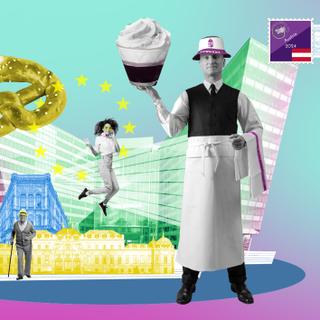


European elections: The rebirth of Vienna, a city looking to the East
FeatureIn the run-up to the EU elections on June 9, Le Monde is looking at the places and cities that fully benefited from the enlargement of the European Union in the late 1990s and early 2000s. First stop, the Austrian capital, which is in the midst of a major renewal.
From her office on the 12th floor of Siemens' vast, modern headquarters in the heart of an industrial suburb of Vienna, Patricia Neumann can contemplate the scale of change her hometown has undergone over the past 20 years. "It's massive, especially when you think of the wounds of the post-war period," said the 53-year-old Viennese business leader, who has taken over as head of the German company's Austrian subsidiary in 2023, after years at the helm of IBM's Austrian subsidiary. For this staunch pro-European, there's no doubt that "we benefited profoundly from enlargement" in 2004, when eight ex-communist countries, including four of Austria's direct neighbors (Czech Republic, Slovakia, Hungary, Slovenia), joined the European Union (EU).
With its futuristic look, the Siemens City campus is a perfect example of the renaissance of the former Habsburg capital that has taken place thanks to the various waves of EU expansion eastwards up to 2013. They have suddenly put Vienna back at the center of the European map. Inaugurated in 2010, the Siemens campus has perfectly fulfilled its objective: to make Vienna the German conglomerate's bridgehead for conquering the new markets of this "new Europe," whose borders begin in Hungary, 70 kilometers to the east of Vienna.
In two wings of airy offices around an "alley" embellished with a café and alcoves for meetings, engineers and administrative managers "of 37 different nationalities" oversee the activity of "33,000 employees" in a geographical area that stretches as far as Central Asia. "It made sense to set up our headquarters for these countries here, as Austrians have had the same mentality as Eastern Europeans since the Austro-Hungarian Empire," said Johann Schindler, a veteran of the company's communications department, as he took a tour of the premises.
Michael Landesmann, an economist at the Vienna Institute for International Economic Studies, put it a little more scientifically: "Whereas we were a small country with moderately competitive companies, highly dependent on Germany, enlargement has given us access to a larger market alongside countries with even weaker economies," he said, on the subject of this enormous "competitive advantage" suddenly enjoyed by the Austrian economy. In 2020, the Wifo Institute estimated that the gross domestic product of the country with a population of around nine million was 15% higher than it would have been without EU membership.
Cul-de-sac of the democratic world
Vienna has come a long way. In the 1980s, "it was considered a dying city," said its mayor, Michael Ludwig, who has been in office since 2018. The Social Democrat showed no nostalgia for that period of his youth when the city was gray and languid. "We were the most easterly city in the West, with a blocked future," said the mayor, now 63, as he entertained guests in one of the lounges of his gigantic town hall built in the 19th century.
You have 72.92% of this article left to read. The rest is for subscribers only.
